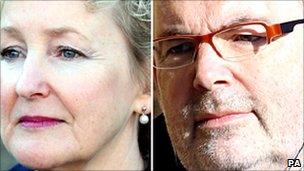Malcolm Webster trial: 'Cheated wife of savings'
- Published

Felicity Drumm said she found a receipt in Malcolm Webster's briefcase
A man accused of attempting to kill his wife accepts he cheated her out of her life savings, a trial has heard.
Malcolm Webster denies crashing a car in New Zealand in 1999 in a bid to kill his second wife Felicity Drumm to claim insurance money.
He also denies murdering his first wife in Aberdeenshire in 1994 in a car fire.
Defence counsel Edgar Prais QC told the High Court in Glasgow, Mr Webster had been "disgraceful" with Ms Drumm's savings but did not try to kill her.
Mr Webster, 51, of Guildford, Surrey, denies attempting to kill Ms Drumm and fraudulently obtain £750,000 from insurance policies.
He further denies murdering his first wife, 32-year-old Claire Morris. She died when the vehicle in which she was a passenger crashed and caught fire in 1994.
It is also alleged that he intended to bigamously marry Simone Banarjee, from Oban, Argyll, to gain access to her estate. It is claimed he told her he was terminally ill with leukaemia when he was actually in good health.
Mr Prais, cross-examining Ms Drumm, said: "My instruction from Malcolm is that it is accepted that he lied to you, repeatedly cheated you and robbed you blind, do you understand?"
She replied: "Yes."
He went on: "You were bulldozed into putting him on to your account and he robbed you blind. He took almost every cent out."
She said: "That's correct."
Mr Prais then said: "There is going to be no dispute about the shoddy, disgraceful, monstrous way Malcolm handled your life savings."
However, the QC said: "As far as the incident on the motorway he wants to make his position clear. It was not his intention to cause any injury."
And he said Mr Webster also denied being responsible for "episodes" Ms Drumm earlier said she had experienced where she had slept for lengthy periods after being given food or drink by Mr Webster.
The court heard that tests carried out by her GP in New Zealand following her episodes revealed a slight problem with liver function. She was told this could be caused by alcohol, drugs or a viral infection.
Ms Drumm told the jury: "I knew I hadn't taken drugs or alcohol. I was concerned it was a brain tumour."
She said she had further episodes in the UK, after the couple travelled there following their marriage and honeymoon in New Zealand.
'Strange turns'
Mr Prais showed Ms Drumm clinical records from her GP in Aberdeenshire.
An entry marked 23 June, 1997, noted "Two strange turns similar to episodes in New Zealand with double vision and ataxia. Probably justifies further investigation in due course".
Mr Prais said: "You say there were further episodes in Scotland and in Cornwall in July or August. Bearing in mind you were told in New Zealand to go to a doctor if there was a recurrence, why didn't you do so?"
Ms Drumm replied: "I was told because of the nature of the incidents they needed to see me when they were happening. They would always happen at a weekend, mainly on a Sunday."
Mr Prais then asked: "Why would you not have gone to the doctor?"
Ms Drumm told the jury: "It was explained to me. There was no point in making an appointment. I still said it could be epilepsy."
The court heard that at the time of the episodes there was no insurance on Ms Drumm's life and she had not changed her will in Mr Webster's favour.
The trial, before judge Lord Bannatyne, continues.
- Published29 March 2011
- Published29 March 2011
- Published25 March 2011
- Published25 March 2011
- Published24 March 2011
- Published21 March 2011